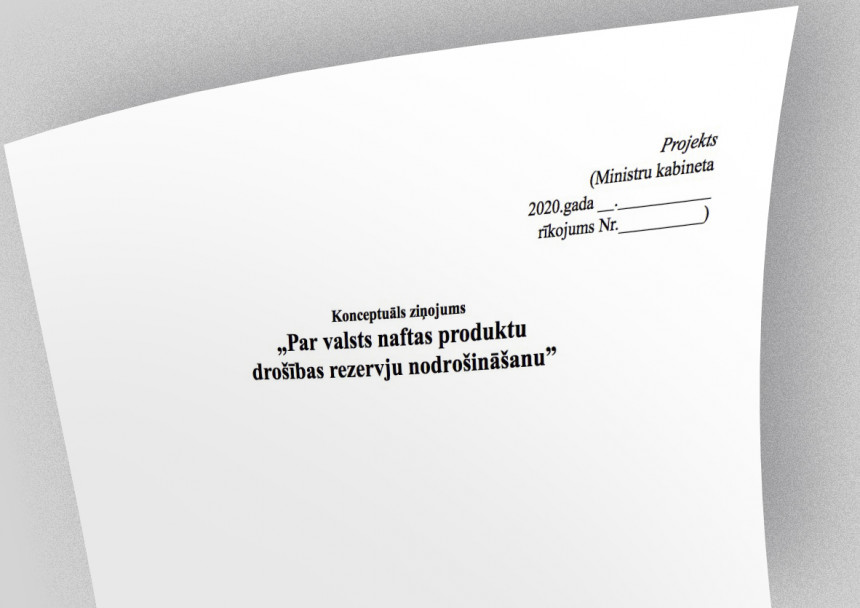The battle for oil reserves is escalating in the government

The attempt to reach a public and open agreement on how to maintain Latvia's oil product safety reserves in the future has failed. Consideration of the information report has been postponed, and now the coalition is continuing to debate it behind closed doors. Changing the existing model of maintaining virtual reserves to a new and more operational one would require an investment of at least 172 million euros, but this is not the main problem either. There is still no consensus in the coalition that this fuel must be physically located in Latvia.
Since last summer, fuel reserves have been the cause of a conflict between the Ministries of Economy and Defense, and now the Ministry of Justice has also gotten involved in the oil storage problem, demanding that the issue be postponed and considered at a coalition cooperation meeting.
Putin's fee has been paid
The government's indecision has meanwhile provided annual revenues to foreign companies that provide Latvia's fuel reserves on paper. The State Construction Control Bureau (SCCB), for which performing such a function that is completely uncharacteristic of this institution has been literally thrust upon, signed new contracts for the storage of oil products in January, and under current regulations, a significant part of the fuel is again located abroad. In addition, one of these foreigners - the Swiss company Gunvor SA - is indirectly related to the President of the Russian Federation Vladimir Putin, cooperation with whom in "today's tense geopolitical situation" does not look good. The Ministry of Defense is particularly concerned about this. Here it is worth recalling why there is this heated discussion in the coalition about the procedure for maintaining fuel reserves.
Reserves as such are formally required to be maintained by one old European Union directive. And for many years Latvia has formally fulfilled this, i.e., it has bought not the fuel itself, but only the right to purchase oil products, regardless of their location. In the short term, it is cheaper. For example, this year it is 14.6 million euros for 352,700 tons of diesel and gasoline stored in Latvia, Lithuania and the Netherlands.
The Ministry of Economy wants an agency
It must be emphasized once again that this is only a volume reserved on paper and that is the main concern of the Ministry of Defense. In the hour of crisis, this fuel will be abroad, maybe foreigners will not give it up, maybe the price of fuel will skyrocket.
And the current situation in the long search for the right solution is as follows. The Ministry of Economics wants to create a special agency that will rent storage tanks from merchants, however, fuel will not be simply reserved for us but will be physically bought and kept in the rented tanks. According to expert estimates, the required amount would cost 172 million euros. It might seem a sensible solution, but the Ministry of Defense does not agree with it, because the documents prepared by the Ministry of Economics again do not say that this newly established agency must store fuel in Latvia. And if only foreigners apply for the competition, then all Latvian fuel, even if it belongs to our country, may be located in the territory of other countries, and in a crisis - again might be unavailable.
In the interests of national security
The Ministry of Defense prefers to maintain the existing system with fuel reservation but to make it clear that most of the fuel - whether redeemed or reserved - must be located in Latvia. For reasons unknown to the public, the idea of 100% of the fuel being stored in Latvia is not even being considered in the coalition. The strategic interests of some fuel traders or the strategic interests of other countries may play a role:
“The Ministry of Defense maintains that compliance with the principle of security of supply is crucial and it is necessary to ensure that as much of the country's oil reserves as possible are stored in the territory of Latvia (at least 75%), and these principles must be taken into account both for the 2021 oil product security reserve procurement and when envisaging further oil reserve storage solutions. We draw attention to the fact that non-compliance with the principle of security of supply may pose a risk to the national security interests of the State of Latvia.”
The train has already left the station
However, opportunities to change the method of storage have already been missed this year. The train has already left the station. SCCB has entered into an agreement with all eight companies selected in the tender - SIA Pirmas, SIA Circle K Latvia, SIA RDZ Energy, JSC Ventbunkers, Vitol SA, Gunvor SA, UAB Okseta and UAB Baltic Petrolium. Merchants are happy, the Latvian state - not so much, because 37% of oil products reserved on paper are stored abroad. 63% will be stored in Latvia, 34% in the Netherlands and 3% in Lithuania. And this is not the worst case, because according to the current regulations, up to 75% of Latvia's reserves may be stored abroad.
It is an absurd proportion and not an order, but a disorder that the government is still trying to protect for unknown reasons.